THE TRAUMA OF MIDDLE EARTH
By Coral Hull
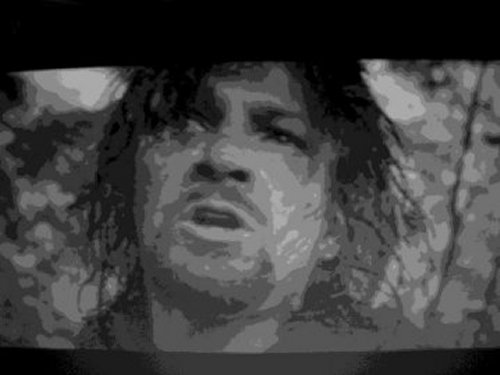
[Above] Boromir #1 (Artwork by Coral Hull, 2002)
"That is a chapter of ancient history which it might be good to recall; for there was sorrow then too, and gathering dark, but great valour, and great deeds that were not wholly vain." Gandalf the Gray
PART ONE - Crisis and Faith
Middle Earth is on the borders of war. It is the end of the third age. The peril is growing in the East. The Elves and other races and cultures are in the process of migration, evacuation and preparation for battle. The threat to survival both on an individual and universal level is imminent. The characters are heroes, soldiers, assassins, mercenaries, refugees and civilians. In order to exist they employ various survival strategies utilised in situations of crisis. They are often traumatised. The main character, a Hobbit by the name of Frodo Baggins, describes himself as being involved in "... a flight from danger to danger, drawing it after me ..." (p76, The LOTRs (trilogy), Tolkien, Guild/Allen&Unwin, 1989).
The characters employ the psychological strategies of combat and display the symptoms of trauma which are often associated with catastrophic events. The character Aragorn (a wanderer and future king) lifts Frodo out of danger after cornering the young hobbit in an upstairs room at the Inn of the Prancing Pony in the northern town of Bre. He warns, "... Watch every shadow! You won't go far. They will come on you in the wild, in some dark place where there is no help. Do you wish them to find you? They are terrible! ..." (p76). He then draws the shutters so that they may not be seen. Frodo is in great danger. He has been followed by nine dark riders (Nazgul/Ring Wraiths) from Mordor. Henceforth, the territory of the heart and mind and indeed of the world are on red alert.
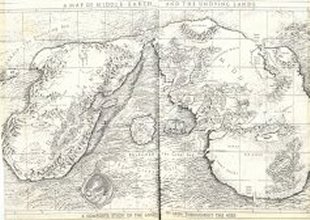
|
The mind of the world and that of the individual are one and the same. History has taught us that trauma is inevitable. Like Aragorn, Gandalf the Grey Wizard and others have known of this peril for some time. Yet we are with the hobbits in our innocence and our discovery. Gandalf gives Frodo instructions regarding the Ring of power that he must ultimately destroy if the way of life we have come to know and love in The Shire (where hobbits live) is to be preserved, "... Keep it safe, and keep it secret ..." (p53). The characters are on a journey, which is often risky and from which some will not return. Or even if they do return some part of them will be changed forever. |
[Above] Map #1 (Artwork by artist unknown, year unknown)
Much of this journey is spent in fight or flight mode. The characters are fleeing and hiding from situations that present extreme danger or that are a threat to their existence. They slip through their identities to become loners or the disguised in order to conceal themselves from the enemy such as when Frodo Baggins must change his name to Underhill. Aragorn adds to his earlier warning, "... for your own sake as well as for others, you will have to go and leave the name of Baggins behind you ..." (p76) Either that or they are turning to face the enemy. It is a landscape of war, apocalypse, cultural purging and beauty under threat from greed, malice and prejudice. The cultural diversity of Middle Earth is under threat. The story is about the attempted genocide of culture and of nature. It is a time where incredible responsibility and risk must be taken by the minority, who are the heroes, both brave and kind.
Innocence is preserved for a time within the reluctant hero Frodo, "... he is still in love with the Shire, with woods and fields and little rivers ..." (p45) Frodo's knowledge is gained to some extent at Rivendell when he takes responsibility for casting the ring into the fires of Mount Doom. But he takes it out of goodness and not the desire for power and he remains dependent on those around him with more knowledge to guide him. "... I will take the Ring, he said, 'though I do not know the way ..." (p188) It is more than knowledge for Suramon has knowledge. Compassion is the ultimate knowledge and is also found in the character of Samwise Gamgee. His simple loyalty and courage make him one of the main players in the fight against evil. He is an unexpected hero, reminding us that the greatest wisdom is in love and not in knowledge. Knowledge alone is not enough. In order for it to be truly effective it must be driven by compassion.
This perhaps is the difference between knowledge and wisdom. Samwise Gamgee seems to be one of the least touched by evil out of all the characters. The ring would never tempt him. His heart is too pure. It has not been corrupted by knowledge that seeks power over life. Sam is a giver, a gardener and a tender of Frodo's needs. His strength and goodness is in making things grow. He is a simple servant of good, one of the meek. Frodo's innocence acts as a protection against evil, but it is not protection enough. In order to survive the trauma of Middle Earth the hobbit Frodo and those who accompany him on his quest to rid the world of evil, must employ survival strategies of flight or fight response, hidden identity, hyper vigilance and in doing so will experience the stress of trauma, sleep disturbance, anxiety disorders, depression and despair, inexplicable fear and a sense of threat and/or urgency. These are the psychological symptoms of a world on the borders of war.
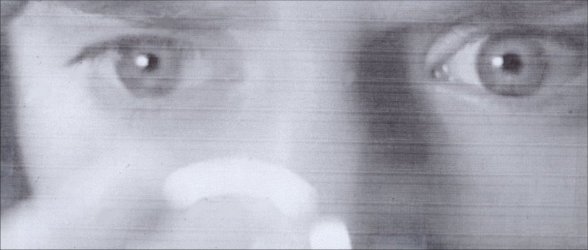
[Above] Frodo #1 (Artwork by Coral Hull, 2002)
When the hero is drawn into war it is through self-defense and necessity. Heroes do not initiate war. The polarities of good and evil exist, yet all characters struggle with their own weakness. Many who have turned to evil were said to be once good, such as Suramon the White. Nowhere is evil more pathetically evident than in the creature Gollum where it manifests as madness. It is a different kind of madness from Suramon. It is madness where responsibility is diminished and choice becomes questionable. The further we travel along such paths the more difficult it is to return. Suramon is still capable of making decisions. His ability to know the difference between darkness and light is wavering, nevertheless is more evident than in Gollum.
Yet both choose the way of evil through their weakness. Suramon is an early wanderer on the path to Gollum. The more we seek power the more it is taken away from us. Gollum and Suramon are not destroyed by the heroes. They are spared and we are reminded that we should not deal out death and judgment when Gandalf says to Frodo, "... Many that live deserve death. And some that die deserve life. Can you give it to them? Then do not be too eager to deal out death in judgment. For even the very wise cannot see all ends. My heart tells me that (Gollum) has some part to play yet, for good or ill, before the end ..." (p73) The insight is that judgment should be left to the higher power and if it is not we run the risk of turning into Suramon or Gollum in our attempts to control that which can only be free to transform.
War is a messy and unpredictable business. Decisions, strategies and well thought out plans often go wrong. Or do they? Was it all predetermined or can we influence outcome? Fate is examined throughout the trauma of Middle Earth. The heroes and villains are in abundance and faith is what keeps both them and us strong, when times are strange and dark and when outcomes cannot be predicted. Aragorn says, "... There are some things that it is better to begin than to refuse, even though the end may be dark ..." (p461) The courage of the characters is made clear through their will to survive and maintain their faith and their belief in themselves against all odds.
The Elven Princess Arwen Evenstar gives up her mortality to Aragorn. She is the vehicle for hope and self-sacrifice. She is fully giving of herself. Her reward is a fearless life but her fate is to ultimately die alone. "... she laid herself to rest upon Cerin Amroth; and there is her green grave, until the world is changed, and all the days of her life are utterly forgotten by men that come after, and elanor and niphrendil bloom no more east of the sea ..." (p1076-1077) Similarly the hero is played by Aragorn who says "... I am Aragorn son of Arathorn; and if by life or death I can save you, I will..." (p187) These are the days and acts of heroes.
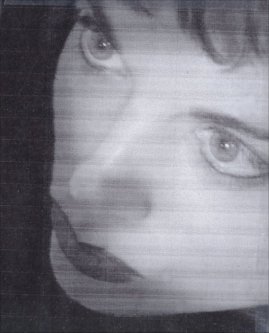
|
When the action of the hero is called upon, it is often due to a situation of crisis. It is through the courage, self sacrifice and the will of the hero that we all find the courage to go on, to move through life's journey when it has become difficult for us to do so. The hero is the leader and often arrives at the station in an unexpected fashion. Are any of us ever really ready for the journey undertaken by Frodo and Sam? We are dared to look into Galadriel's mirror showing all future possibilities, but only few would withstand the burden of such a discovery. Yet there is hope. "... In this phial is caught the light of Earendil's star, set amid the waters of my fountain ... It will shine still brighter when night is about you. May it be a light to you in dark places, when all other lights go out ..." (p397). The gift of everlasting hope is passed on to Frodo from the Lady of Light - Galadriel. Even as the glory of the Elves of the golden forest of Lothlorien fall into shadow, the ultimate light of Earendil's star is worn close to the heart of the individual. |
[Above] Frodo #2 (Artwork by Coral Hull, 2002)
The beings who inhabit Middle Earth teach us that authority and bureaucracy are not always the best option when it comes to heroic achievement. There are times when the light of the individual will succeed when a series of individuals who attempt to cooperate do not. While the characters often work together it is made very clear that our ultimate existence is that of aloneness. The challenge of enlightenment is between that higher power and ourselves. Even though they provide the catalyst, the strength that endures is found in simple friendship rather than within organised institutions such as Elrond's Council. The friendship of Frodo and Sam Wise Gamgee endures even when monarchies and civilisations flounder, alliances are strengthened or weakened and quests and fellowships fail. Love and loyalty are simple strengths and they endure against all odds. In the climate of Middle Earth the ultimate intelligence lies in leadership and creativity so long as it is based in morality and spirituality. The Elves were creative but only so far as the light instructed them to be creative. They respected all nature and built not from the woods, but in unison with nature, around the trees or the things of the Earth. The designs and their ways were at one with the Earth and not exploitative of it.
Whereas the dwarves chose mining, they dug too deep and unleashed evil or what was beyond their control. They did not attempt to control it. But they were confronted by it as a spectre of their own actions, perhaps as a result of simple ignorance. As many sought only to bring light into the darkness of the Earth. While dwarves are considered prone to greed and materialism, there is much sympathy for their love of beauty and artistry that borders on the spiritual. The dwarves possess true creativity. Gimli falls in love with the lady of light requesting three strands of her golden hair. For no matter how deeply we have dug it is our fate to fall in love with the light that is, once we open our hearts. The transformation from darkness to light must be made if we are to continue. It is not only the emergency of the genocide of races and cultures, but of the very nature of the Earth itself - the forests, the way of life in Hobbiton, the light within our own hearts. All is under threat as the emergency of Middle Earth builds and trauma is the symptom of it.
There is an inevitability about the outcome that Elves are describe as "... together through the ages of the world we have fought the long defeat ..." (p376) At the same time there is always the voice of Galadriel who reminds us, "... your Quest stands upon the edge of a knife. Stray but a little and it will fail, to the ruin of all. Yet hope remains while the company is true ..." (p376) Hence not only will good triumph over evil in a way that evil will be destroyed, but evil will transform to become good. In the meanwhile we must go on. We must endure and have faith in a higher power. Ultimately the characters will travel to the undying lands. They will diminish and be forgotten. They will transform but that higher power does not abandon them. They are absorbed into it, possibly into love as the face of Aragorn is said to shine upon his death. "... Then a great beauty was revealed in him, so that all who after came there looked on him in wonder; for they saw that the grace of his youth, and the valour of his manhood, and the wisdom and majesty of his age were blended together ..." (p1076) It is spoken for all that would listen. The great eagle Gwaihir the Windlord soars above the apocalypse of Isenguard and arrives to rescue Gandalf the Grey (held prisoner by Suramon the White) from the tower of Orthanc at dawn as sure as light follows darkness. Likewise it is also the dawn that Aragorn looks towards at the battle of Helms Deep. "... I looked out to see the dawn ... None knows what the new day shall bring him ..." (p563) For a while it was dawn that kept the orcs at bay. But times have changed. The trauma of Middle Earth is about how to deal with a situation of emergency therefore it did not surprise me to find out that Tolkien began his writing of The Book of Lost Tales while in the trenches of World War II.
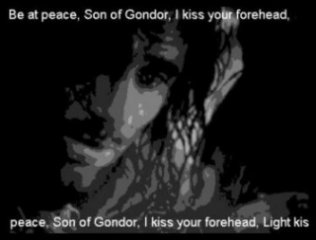 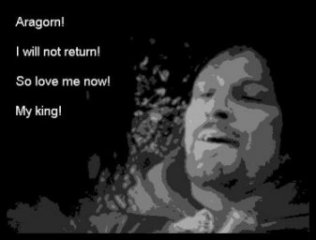
[Above Left] Aragorn #1 (Artwork by Coral Hull, 2002) [Above Right] Boromir #2 (Artwork by Coral Hull, 2002)
The birthday party of Hobbiton is over and the hobbits have entered the world of trauma. Yet there is brief sanctuary when the characters arrive at the house of Tom Bombadill and the golden forest of Lothlorien, where Galadriel notices their weariness and says, "... do not let your hearts be troubled. Tonight you shall sleep in peace ..." (p376) Celeborn then adds "... Go now. You are worn with sorrow and much toil ..." (p376) As the characters rest we can rest within the churches of golden leaves and the goodness of the spiritual. But not for long. In Tolkien's perception of the world we are merely gaining strength in order to enter the next battle zone. The war is over the preservation of goodness. The preservation is not such that transformation should cease, but that all that is good within our hearts, all that gives us our humanity, or makes us human should continue. At the same time this is to be done without judgment.
The wars for the heroes of Middle Earth are ones of defense and not attack. The characters take up arms in self-defense. Frodo is the reluctant hero, "... I wish it need not have happened in my time ..." (p64) To which Gandalf replies, "... so do all who live to see such times. But that is not for them to decide. All we have to decide is what to do with the time that is given us ..." (p64) In this situation of emergency, it is either take up arms or die, fight or depart like the Elves. The world is in dire peril. The survival not only of the individual but of the light source is again at stake. The fact that this has happened before suggests that this occurrence is cyclical, that there will be renewal after death. But this will not happen without struggle. It is the challenge of struggle that keeps the light source abundant in a universe that forever threatens only darkness. The coin must continue to flip sides if the dance of life is to continue, in which all have a part to play, both the darkness and the light. Beyond that who knows?
We follow the epic journey of the reluctant hero, Frodo Baggins, throughout Middle Earth. He has come from Hobbiton, the place of all light and greenery. The peaceful place of growth and simplicity. Yet his childhood has been far from perfect. Frodo Baggins was orphaned and adopted by his Uncle Bilbo, whom as we know carried on with all kinds of adventures, including wandering away from the relative safety of The Shire where he engaged in battle with dragons and trolls, while finding treasure and a magic ring of power, and who ultimately passes the burden of responsibility for Middle Earth onto his nephew. The burden is handed down to the next generation and Bilbo is apologetic about this.
For the Ring of power has already corrupted Bilbo and he now fears for the fate of his nephew. Bilbo understands the corrupting influence of power all too well. The Shire is what is at risk if Frodo should fail at his task at casting the Ring into the depth of Orodruin, the Fire-mountain. The Ring of power or 'the illusion of power' or whatever interpretation one wishes to place upon it is an illusion. It may appear to have rewards but the penalty is great. In a similar way to Sam and Frodo we must leave our 'Shires' behind in order to enter the world and take responsibility for its future.
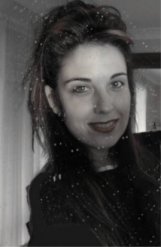
|
Bilbo warns us, "... It's a dangerous business, Frodo, going out of your door, ... You step into the Road, and if you don't keep your feet, there is no knowing where you might be swept off to ..." (p87). There are many risks associated with leaving our comfort zone. While there are guiding lights along the way, there are no guarantees of success. The quest is placed in the hands of the individual entering the unknown. The role of 'ring bearer' or the bearer of burden or responsibility comes with knowledge that exists outside The Shire. The way of life in The Shire was always under threat. But it is the knowledge of this that forces Frodo into action, taking part in a series of events that will change the course of the future. There is room for community, friendship and the individual in Tolkien's Middle Earth. All have their part to play even the corrupted such as the creature Gollum and Grima Wormtongue. |
[Above] Elf #1 (Artwork by Coral Hull, 2003)
Gollum is the other side of the coin upon which Frodo stands. Like Suramon he is the focus of weakness and evil. His power comes from resilience and a brute strength that does not require intelligence but cunning. He desires all things that are precious. He is about preservation and hence control, but the transformation still occurs within him too, as it must, but in Gollum it takes a turn for the worse. He has his mind set on the ring and therefore plays no part in his own growth and transformation. His desire for control does not come as big as Suramon. It is a small desire over a small object, nevertheless it is still born of the same weakness and the impacts are just as catastrophic. Since small actions have great consequence and everything is interconnected, they effect the whole of Middle Earth, and that is where power must be re-arranged. Gollum is launched into the death that was always there but that never occurred until it came to him and he to it all at once at Mt Doom. Slow and gradual transformation is wisest. But Gollum is also necessary, just as long as evil and weakness are necessary in the world. We must not destroy evil nor attempt to control it. We must fight it when we have no choice but we must also acknowledge its emergence in our hearts in order to have compassion for it. For it is only through compassion that we will mend the evil, the weakness and the Gollum desires within ourselves. When we are compassionate or full of good we can think clearly and act responsibly and hence can assist in the transformation of darkness to light.
The characters of Middle Earth cover the full spectrum of humanity and beyond, that mystery which we are or indeed what we are capable of being. When we love the Elves we are loving that part of our character that is closest to the light. I am an Elf. And my home is Lothlorien - the forest of light. One of the saddest moments for me in Middle Earth was when the characters left Cerin Armoth and each were given gifts by Galadriel. One if the most touching and unexpected encounters was when Gimli the dwarf fell in love with the Lady of Light saying that, "... I have looked the last upon that which was fairest, ... Henceforth I will call nothing fair, unless it be her gift ..." (p398) Leaving the forest of Lothlorien never to return as seen through the heartache of Gimli and the acute senses of the Mirkwood Elf Legolas Greenleaf. This is our formal goodbye to that which is too holy for humanity. As we departed from Lothlorien so was this the formal departure of the Elves from Middle Earth. Their time had come which to some may be the natural order of things, but somehow it is always tragic when beauty leaves the Earth, or is not enshrined, or perhaps entombed by permanence.
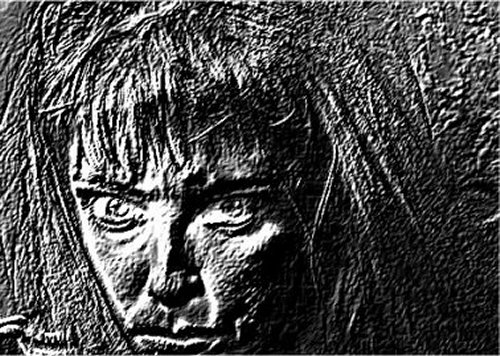
[Above] Gollum #2 (Artwork by Coral Hull, 2003)
The Elves show the transient nature of all life - the endings and beginnings. Yet I cannot help but think that they are too holy for the Earth, unworldly. I cannot help feeling that sense of acute loss of the Elf folk and their godliness. A light was extinguished because the Earth itself was not capable of receiving and nurturing it. They are representative of the good that die young; as all our innocence dies inside us, so the music of the Elves is extinguished. The Elves are children and gods at the same time. But we do not travel with them. We are not of them. Instead we lose our innocence through the journey of the main character Frodo, and come to realise that the only way Elves or perhaps even angels are to survive on the Earth is to make the transformation into the hardness and wisdom of the wizards. For the wizards are said to be angels in the bodies of old men. The transformation and adaptation to a world that is dark has been made by them. While the Elves built around the trees they did not adapt to darkness. They are Elves and as such they could only bring their light into it.
In Middle Earth there are a myriad of characters only ever passing this way once such as when Gimli turns back briefly to stand and stare into the stars of the crown of Thorin, in the Mirrormere, of deep Kheled-zaram and says, "... I cannot pass without turning aside for a moment to look at the wonder of the dale ... Now long shall I journey ere I have joy again ..." (p351-352) The dwarf's action shows the transitory nature of everything. He will not come that way again as in his experience with the Lady of Light Galadriel, he would not love that way again. Transformation carries with it sorrow and sadness but it is a natural cycle of life that must be accepted with both grace and wisdom and courage. There are harder transformations to accept such as the destruction of the forests for not all loss is good or even necessary. It could be said that some loss is unnecessary and we might equate this with the loss of animal and plant species from the Earth, the loss of children to illness, poverty and disease, starvation and predators. The loss of spiritual innocence can also come too early as perhaps is did for Tolkien when his mother died when he was still a child. Tolkien may have relied on strengths that are now placed into the hearts of his characters. Yet the warning in the Ring is that some kind of transformation must ultimately occur, that is good and natural, for while none of us are really prepared to depart the perfect childhood of Hobbiton, Bilbo Baggins holds on too long and becomes old, "... Why, I feel all thin, like butter that has been scraped over too much bread ..." (p45) If we hold onto the Ring, we will become like the Wraiths, doomed to an existence devoid of what life is.
The Ring Wraith's only calling is of power, they are drawn only to the power of preservation, but preservation without life is like a museum, behind glass. It is "neither living nor dead." In Tolkien's view of the world transformation is necessary even for immortals such as Tom Bombadill and the Elves who transform through the act of creativity and their arrival and departure. Their journeys are the transformation. Transformation only ceases in the undying lands when we put our souls into the hands of the higher power.
Only then does transformation cease and eternity begin. Until that time it is necessary and the journey must be made by all. As Tolkien was abandoned by his mother at her death so was Frodo orphaned. It seemed they had no choice but to be thrust from innocence into the dark world of heroism and adventure. For some children the calling comes early. But when are any of us truly ready to confront these fears, both within ourselves and in others.
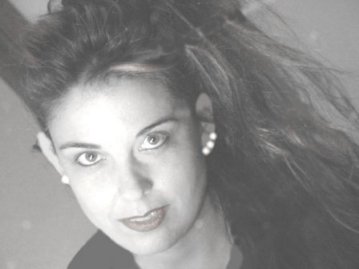
|
Gandalf knows that he must confront the Balrog of Morgoth but even then he attempted to avoid it by crossing Cathadras rather than risking The Mines of Moria. It is only after we confront these things that we will gain wisdom. Just as Gandalf made the transformation from a grey to a white wizard. Aragorn says, "... He has passed through the fire and the abyss, and they shall fear him. We shall go where he leads ..." (p522). These small deaths are necessary if we are to evolve to our full potential and therefore have and impact on the world around us that us in ways that are constructive, positive and creative. |
[Above] Goblin #1 (Artwork by Coral Hull, 2003)
Once we have accepted all transformation as natural we can let go of past memories and future anxieties. We can live in the eternal moment or with the perception of the oldest being on Middle Earth, Treebeard or Fangorn. "... One felt as if there was an enormous well behind them, filled up with ages of memory and long, slow, steady thinking; but their surface was sparkling with the present ..." (p484) This is the place where all cycles come to a central point and where time and place no longer exist. It is in this enlightened state that we experience the eternal and undying presence of god. Tom Bombadill is of god, or as close to god as nature. He is both god and caretaker and is described as very ancient, but he is also said to be in perfect harmony with nature because he is nature itself. "... Tom Bombadill is the Master…Tom walking in the forest, wading in the water, leaping off the hilltops under light and shadow. He has no fear. Tom was here before the river and the trees ..." (p139) He is at once both unpredictable, approachable, impenetrable, jolly, fearless and dangerous.
His gaiety and sensuality allows the hobbits to discard their clothes and run naked in the sun after their encounter with the Barrow Wights on The Barrow Downs. Tom Bombadill unmasks all pretensions and turns death into life. He is lusty and detached. He only has heart for Goldberry who is of the river and woods and his purpose is to replenish her essence by bringing her small gifts from nature. Their relationship is kept private. It is the perfect relationship. They grow together and apart with no argument or expectation. They assist in each other's growth. A combination of intimacy and independence is attained.
There is harmony and mystery in the house of Tom Bombadill and fear leaves its cloak outside. "... Let us shut out the night! For you are still afraid perhaps of mist and tree-shadows and deep water, and untamed things. Fear nothing! For tonight you are under the roof of Tom Bombadill ..." (p138) Tom brings Goldberry the lilies for her feet from the pond and yet there are many times where she goes and dances in the forest alone. Their relationship is perfect for only they can share it. We are visitors but we do not become voyeurs when we are welcomed in the house of Tom Bombadill. We are there by invitation and only briefly. For here we are confronted with both the god of nature and the unworldliness of the Elves. The house of Tom Bombadill is an alternative universe and although like the hobbits we can't quite place our finger on it, we sense that something very powerful is occurring here.
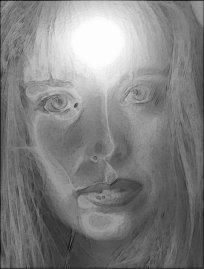 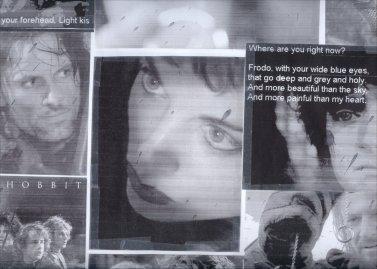
[Above Left] Elf #2 (Artwork by Coral Hull, 2003) [Above Right] Collage #1 (Artwork by Coral Hull, 2002)
We can only trust the hospitality and eccentricity of this couple just as the hobbits blindly followed Aragorn into the forest on their way to Rivendell. Aragorn is well adapted to the forests and natural and wild places of Middle Earth. Bombadill has retreated to the church of deep contemplation. He does not need to adapt for he is all those things. In his own way he has departed. But unlike the Elves he remains in Middle Earth by claiming small territory as the grass reclaims an abandoned road such as the Greenway. He does not go beyond the borders. The Ring of power had no affect on him as nature itself is not motivated by what the ring offers. Nature is not stagnant and the only control one has is to move with its giant presence. It is in transformation - chaos and order, wisdom and nonsense, stupidity and shrewdness, knowledge and innocence. All opposites meet in Tom Bombadill. In order to glimpse and relate to him, we can only dance around what is the essence of him, such as Goldberry does. We can only dance with life in acceptance and compassion. We cannot seek to fully understand it, nor have control over it.
No one is immune from the desire for power, which is why Elrond of Rivendell knew that the Ring must be destroyed when he told Isildur to cast it into the fires of Mount Doom. The wizards represent the struggle between self and selflessness. Suramon says, "... But we must have power, power to order all things as we will ..." To which Gandalf replies, "... And he that breaks a thing to find out what it is has left the path of wisdom ..." (p276) Gandalf flies away into the dawn on the great back of the Gwaihir the Windlord. In this way Gandalf chooses to place his transformation in the hands of the power greater than himself. Whereas Suramon travels no further. All growth and transformation have ceased. He is on his way to the museum, to the spiritual entombment of the psyche.
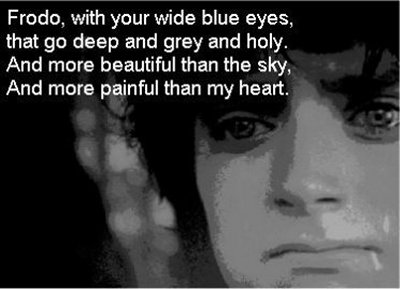
|
The illusion of permanence has tricked him into thinking of immortality. He has attempted to become greater than life but he has been tricked and instead he has become a corpse, which passes through life and death cycles untouched. When he is untouched by pain he will be untouched by joy. All sense of faith and goodness and morality are lost and he becomes what we call the Nazgul, the walking dead. There is tragedy and sorrow in all things, even in transformation. Suramon fears this change. |
[Above] Frodo #3 (Artwork by Coral Hull, 2002)
Orcs, Trolls, Goblins, Uruk-Hai - all are examples of the madness that consumes life. But none is more potent than the creature Gollum. He is the final product, the end result of this weakness turned madness. Frodo carries the Ring because his innocence protects him from its power. But this will only occur temporarily, for the more Frodo loses his innocence in the world, the more the ring will have influence over him.
Innocence is the realm of the gods and as such there is protection. Once we step beyond that, the borders of Hobbiton, we enter the journey of life, just as Sam sand Frodo did when they left The Shire. In order to cope with what life places before us we are prone to temptation. This temptation is not always human or hobbit weakness. In Middle Earth the Ring has a power separate from any character. There is the suggestion and the evidence that evil exists as good exists, that is manifest as a force beyond any of us. "... A Ring of Power looks after itself, Frodo. It may slip off treacherously, but its keeper never abandons it ..." (p68) And "... Behind that there was something else at work, beyond any design of the Ring-maker ..." (p69) "... Do not tempt me! For I do not wish to become like the Dark Lord himself ... I dare not take it…The wish to wield it would be too great for my strength ..." (p75) Gandalf's strength was in not succumbing to temptation even after he had gained knowledge. Galadriel is also tempted when Frodo offers her the ring of power, "... I pass the test, she said. 'I will diminish, and go into the West, and remain Galadriel ..." (p385)
The struggle will always be within each of us. All characters are tempted. None are immune. Gandalf and Galadriel have their moment. Gandalf says the desire for power would find its way into him through his desire to do good, but that even this would corrupt him. This is where the Boromir failed. He thought he was powerful enough to use the Ring to do good. He had a kind heart but he lacked the wisdom of Gandalf. This was his downfall. But in none do we see this struggle so acutely as in the character of Aragorn, son of Arathorn. He must finally come in from the wilderness of the mystic to take his place as a leader amongst humanity. It is Aragorn's struggle with how to deal with power that we follow, and the way he does it is through morality, faith, loyalty, responsibility and courage, despite being the heir of Isildur who was tempted and then destroyed by the Ring. Like Gandalf the grey wizard, Aragorn will fight his own Balrog of Morgoth, for like the Elves Aragorn also places himself in the position of being a vehicle for light. While good is often used as an excuse to perpetuate evil, good is in fact where all our greatest strengths and attributes come from. The most successful characters in Middle Earth are the ones who operate as leaders of humanity and yet who have also turned their lives over to the power greater than themselves. This is the wisdom of compassion and humility. There is a sense of the holy both within and without. Everything is interrelated. The only way out appears to be the service of the will to god, or the greatness of being.
PART TWO - I Am Arwen
I was walking along the streets in Manhattan in this ecstatic state which had gone on for several months and suddenly the words came into my head, "I am Arwen I am Arwen" It happened after an encounter with a new friend in Manhattan. The person and myself had stood on a rooftop and watched the rivers of light, which were actually lanes of traffic pouring through the city that held on to the edge of snow. It was an extraordinarily beautiful experience. In fact it was perfect, therefore making all other experiences perfect. There was this intensity that was beyond expression and inwardly some kind of collapse was occurring that felt like layers of light folding in upon themselves.
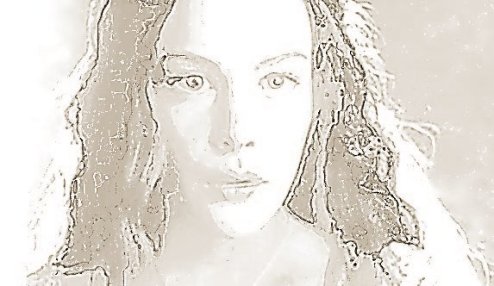
|
Perhaps it was his biceps but all I could think of was that my life was ending or beginning in light. It was hypnotic and a challenge to remain upright. The word Arwen was a way of grounding myself. The words came over and over throughout the evening spent with him and rolled in like waves of meditation throughout the next week. |
[Above] Arwen #1 (Artwork by Coral Hull, 2002)
I had no idea why I was repeating them over and over again and no intention of writing them down. I was simply being. I was completely carried away by the present where there seemed no past and no future. After a time period that seemed longer than months I wrote. Twenty pages of Arwen poured out within half an hour. Then it was simply a matter of writing them down and then editing out the repetition in order to enhance the music. A week later there were 60 pages of notes. Then one more night at the movies with my friend Elaine and there was another 60 pages of notes. Within four weeks of Arwen there were 120 pages of notes that I have been gradually reworking throughout 2002.
In this case the characters will dictate to me. I hear lines as an inner whisper and write them down or the words will come in lines of poetry. I become the character before I write. The obvious character I began with was Arwen Evenstar. The relationships were unconscious. I did not deliberately choose a character. Instead that character became appealing to the extent that it mirrored my own unresolved issues, until everything aside from that became oblivious - it was a similar experience to falling in love. The Arwen poem was written. The world was filled with light. The next poem to come was about how Frodo slips into an alternate world once he places the ring of power upon his finger. In these moments he goes elsewhere to fight his own shadows and only when he removes the ring does he return. Perhaps each time that little more changed. This very much reminded me of the places I go when in the grip of a PTSD (Post Traumatic Stress Disorder) episode. It is a feeling of one reality shifting into another reality that is based on fear, but that could very well exist of its own accord. In either state one is not sure where the real world ends and where the fear world begins. They both exist simultaneously until one enters them both not as real, but as a ghost or a partial inhabitor of each world. None can follow you to such places and nor would it be wise and nor would you want them to.
The third poem was when Gandalf fought the Balrog of Morgoth (a demon from the ancient world) on the bridge of Khazad-dum in the mines of Moria. The words kept repeating over and over in my head "You will not cross! You will not cross" until I had become the wizard. Then I was suddenly a child of perhaps 4-6 years of age protecting my mother against (not a Balrog) but my drunken father. The defiance and fear that I felt was similar to what the wizard must have felt but there was more. It said "you will not cross --- into my heart today." The second line of course is mine and was when I realized that when confronted with such monstrosity boundaries dwarves are both broken and protected, just as the bridges to the soul and to the mines of the dwarves and are both broken and protected. Just as Gandalf fought that mythical monster so I had fought my own father as a child, both on the outside and the inside, as his psyche became part of my own learned behaviour. When Gandalf gets dragged down into the pit with the Balrog I believe that it is his moment of doing battle with the darker side of his own nature. He later emerges victorious as a white wizard. But he is forever transformed by the depth he has reached. Part of him had to end in order for the other part of him to continue. As we approach evil we become it, even if only for a short time. I believe that I am the character. I believe in Middle Earth; I believe in the whole experience. There are no boundaries. There is no distinction, only absorption and response.
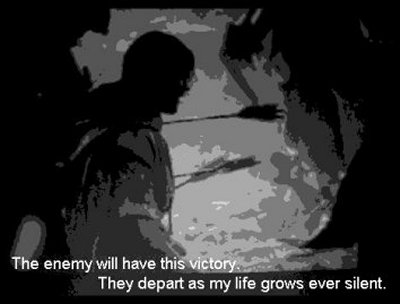
|
The death of Boromir took my sympathy almost immediately. It was mainly about the loss of him. I was up all hours of the morning sobbing over his death. The poem on Boromir's death was an interesting exercise in extending the atmosphere and dialogue that appears both in the book and the movie. At such times I may play act or mimic the characters over and over again until some sense of why I am saying the line comes to mind. At present I move back and forth between both. Many of the lines come into my head throughout the day instructing me on how to live or cope with situations and I write them down. |
[Above] Boromir #3 (Artwork by Coral Hull, 2002)
During these times I have taken photos or made collages (some of which are included in this article) and examined and manipulated them in order to understand what part of myself I am tapping into. The photos are subtle. I am not dressing up as a character. The process is internal. I was interested to see to what extent it would come through. Sometimes they may be lines from the actual movie or the book and other times they are the voices of the characters but of my own thoughts and sentences. It is as if I am adding onto the story or filling in spaces. There is room for one to do this when it comes to the vastness and mystery of Middle Earth. The scene is set for the imagination to wander over the lands as the characters wandered and to engage in activity of both dialogue and plot. For much of what occurred is simply relayed through the eye witness accounts of characters. It is as if the world of Middle Earth and beyond is in fact too immense to know, that is greater than us all. There is a sense of mystery and elevation that provides the ideal stage on which the imagination can go to work. In this case my exploration of the characters via self portrait and collage of Middle Earth has also been about play. This 'play' allows the meditative process and hence the breaking down of boundaries to continue.
What first takes my attention is usually a lead in to what I am meant to write about and hence discover about the world and myself. There is a certain way the characters in Middle Earth talk. It is a proper, dramatic intense form of expression. Peter Jackson and crew captured this emotional intensity well in the film. There are numerous scenes in Middle Earth that take my attention, I start with my own psychological issues and I gradually build layer upon layer into the poems so that while they will represent Middle Earth they will take on their own reality just as Director Peter Jackson's interpretation of Tolkien followed but also took on its own reality.
Middle Earth is not stagnant. It is to be explored and interpreted - respected and interrupted. It is the basis for further exploration of both Tolkien's cosmology and beyond it. I use the language of the characters because I can directly relate to it. In a utopian world that is the way in which I would speak. I am not attempting to rewrite The Lord of the Rings as poetry. Tolkien's words are poetry enough. Rather I am attempting to explore my own psychology and that of others around me and what the characters teach us about ourselves.
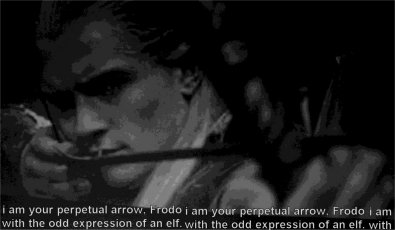
|
The last night I saw The Fellowship of the Ring in Chelsea I asked a guy next to me how many times he had seen the movie. He had seen it 20 times. It was my 7th. I took in paper and wrote about 60 pages free hand. I stayed up the whole night before flying back to Australia and wrote the rough copy of the book. Of course since then the work has gone through at least 30 drafts. I have now watched the movie or sections of it over 50 times including both versions on DVD. |
[Above] Legolas #1 (Artwork by Coral Hull, 2002)
I am on my third careful reading of the books. Both movies are about relationship as much as about plot. I have looked at the language and actions of the characters and their relationship to their surroundings and each other. I have utilised lines from both movie and book and reinterpreted them. At first glance it may appear that I am role-playing, as one would stand in front of a mirror mimicking a rock star while singing into a comb. This is certainly a part of the process for me. But it goes deeper than that. The various journeys and behaviours of the main characters (both savoury and unsavoury alike) mimic much of my own life. The process of personal exploration via the poetic process in relation to Tolkien's text is extremely rewarding. I have used this story as both a teacher and a guide, that I believe works on all levels of human existence, both social and historical, personal and spiritual. There is no denying that the story has captivated our culture. Beyond the mass marketing and commercialisation of Tolkien there is a depth that will not be conquered. There is a sacredness about it that leaves one in awe and respectful. It is a good and decent story that touches the good and decent parts within all of us and it is for this reason that we continue to cherish it.
Conclusion
The crisis of Middle Earth occurs through violent conflict where 'war' is apparently the only option (both within and without) if the dance of life is to continue. War is the result of a society and of individuals out of harmony with the earth and each other. The hobbit Sam Wise Gamgee perceives a world beyond the duality of good and evil, beyond the concept of 'the enemy' and beyond war. "... It was Sam's first view of a battle of Men against Men, and he did not like it much. He was glad that he could not see the dead face. He wondered what the man's name was and where he came from, and if he was really evil of heart, or what lies and threats had led him on the long march from home; and if he would not really rather have stayed there in peace ..." (p687). The solution to crisis is dependent on something greater than ourselves. It is the all encompassing presence where all notion of duality ceases. The miracle is that it can be found within the realms of life on Middle Earth as much as within our own hearts. There are many truths from many sources. However the relinquishing of personal power and hence control to a greater power is the only solution, if the soul of the individual and life on Middle Earth is to survive. This is basic faith. It does not necessary stem from one religion.
In Tolkien's world we have all religions combined. The animals and trees communicate with each other. Gandalf is rescued by the eagle and is only on the back of Shadowfax because the mythical horse allows him to be there. The horse remains untethered. Nature is respected by those who possess wisdom. The Elves talk to trees and indeed are described as trees themselves. Legolas is described as, "... standing, gazing northwards into the darkness, thoughtful and silent as a young tree in a windless night ..." (p446) when he leans forward to see along the plains of Rohan during his search for the missing hobbits, Merry and Pippin who have been taken by orcs. Treebeard describes the Elves and trees as having an intimate relationship when they taught trees to talk. "... Elves began it, of course, waking trees up and teaching them to speak and learning their tree talk. They always wished to talk to everything, the old Elves did ..." (p494) Whereas Suramon is described as an exploiter, "... he does not care for growing things, except as far as they serve him for the moment ..." (p494) Nature is sacred. Good and evil are locked into an embrace. All have a purpose and must be free to transform if the dance of life is to continue. Energy moves along a spectrum of beginnings and endings until eternity is attained.
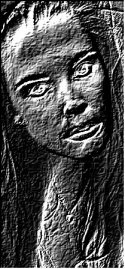 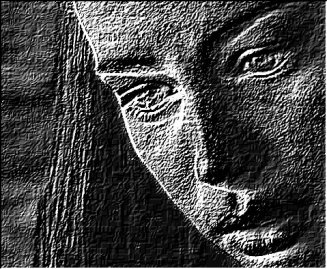 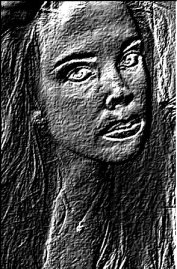
[Above Left to Right] Arwen #2 (Artwork by Coral Hull, 2003) Arwen #3 (Artwork by Coral Hull, 2003) Arwen #4 (Artwork by Coral Hull, 2003)
There is always this longing for home or that place of light and simplicity within the heart, such as The Shire and Hobbiton. Each has their own sanctuary to which they long to return. "... Gondor! Gondor!' cried Aragorn. 'Would that I looked on you again in happier hour! Not yet does my road lie southward to your bright streams ..." (p442-443) Many of the characters enter the wilderness of war. But the wisest and therefore strongest characters Galadriel, Celeborn, Elrond, Ents, Bombadill, are either responsible ring bearers or wholly unaffected by the desire for power. As such they make the greatest leaders. They stay within their lands, in sanctuaries that are magical, hidden and so often if not perpetually under threat from the outside world that harbors and regenerates evil.
The challenge of Aragorn is to return from a wilderness of exile and reclaim his responsibility as King of Gondor. He fears the weakness in himself, the weakness of men. He is the heir of Isildur who chooses to keep the Ring of power rather than turn it over to a higher power. It is Aragorn's fate to become a leader, but of the compassionate and ethical kind, where all life is interconnected. In order to achieve this and to grow beyond weakness both inherited and otherwise, he must turn his faith over to the higher power and rule in peace and compassion. This is the true meaning of love. We must relinquish personal power and control for humility and self sacrifice in order to rule wisely. We must weld fire but also adopt the burden of responsibility as we strive for virtue in order to serve the greater good.
Everyone has their own Middle Earth experience and this has been a few words about my experience, at least for now. Middle Earth was created and investigated by JRR Tolkien but in the greater scheme of things it belongs to no one and nothing but itself. The world is of itself and as such it has become part of all of us. Those who love it belong to it. It is not owned by Allen & Unwin and nor its it owned by New Line Cinema and the various merchandise companies. It is bigger than that. It is a world and a world can belong to none but itself. The stories go deeper than the glittering caves of Aglarond of Helm's Deep and nothing can take the feeling of belief that this actually happened, that there were actually Elves on Earth. I do not lay claim to the ultimate interpretation of Middle Earth. I am simply a small voice and like all that love this story I believe that I have my part to play in its continuation. As Tolkien knew too well, the crisis of Middle Earth is larger than us all.
To engage with this cosmology is a humbling experience that can only leave one in awe and with a sense of gratitude to their creator and/or investigator. I have learnt much from the characters and have been able to apply the stories and dialogue to my own life. These few words are simply my way of trying to grasp the immensity of the cosmology and to say how deeply affected I have been by the whole experience. Like the characters of Middle Earth, we are living in an endangered world, under a situation of threat. Gandalf the Grey Wizard turns to King Theoden on the way to Isenguard and says, "... not only the little life of men is now endangered, but the life also of those things which you have deemed the matter for legend ..." To which Theoden replies, "... For however the fortune of war shall go, may it not so end that much that was fair and wonderful shall pass forever out of Middle Earth ..." To which Gandalf says, "... It may…But to such days we are doomed. Let us now go on with the journey we have begun! ..." (p573) And so may the story of this world continue…
Acknowledgements:
Beyond The Movie: The Lord of The Rings: Fellowship of the Ring, (DVD), National Geographic, 2001.
Lord of the Rings.Net Website (http://www.lordoftherings.net/)
The Lord of The Rings: The Fellowship of the Ring, The Two Towers, The Return of the King, (novel trilogy), Guild Publishing/ Allen & Unwin, 1989.
The Lord of The Rings: The Fellowship of the Ring, (Movie), Peter Jackson, New Line Cinema, 2001.
The Lord of The Rings: The Fellowship of the Ring, (DVD), Peter Jackson, New Line Cinema, 2001.
The Lord of The Rings: The Fellowship of the Ring, (DVD/Extended Version), Peter Jackson, New Line Cinema, 2002.
The Lord of The Rings: The Two Towers, (Movie), Peter Jackson, New Line Cinema, 2002.
About the Writer Coral Hull

|
Coral Hull is the author of over thirty-five books of poetry, fiction and photography. She is an animal rights advocate who has spent much of her life working voluntarily on behalf of animals, both as an individual and for various non-profit organisations. She has recently completed a book called Voices from the Dark, exploring mental processes and creativity. Her book Broken Land: 5 Days in Bre won the Victorian Premiers Award in 1998 and was broadcast on ABC Radio National. She received her first literary grant (Established Writer category) from the Literature Board of The Australia Council for the Arts in 2001. Coral is the Editor and Publisher of Thylazine, an electronic journal featuring articles, interviews, photographs and the recent work of Australian writers and artists. She completed a Doctor of Creative Arts Degree (Creative Writing Major) at the University of Wollongong in 1998. When not on specific assignments in regards to her writing and photographic work, Coral lives in Sydney. An extensive biography, list of publications, awards, festivals, interviews, articles, reviews and photo and art folios can be found on Coral's website. |
[Above] Coral Hull, Elliot Hotel, Elliot, Northern Territory, Australia. (Photo by Coral Hull, 2001)
I Next I
Back I
Exit I
Thylazine No.7 (March, 2003) |



